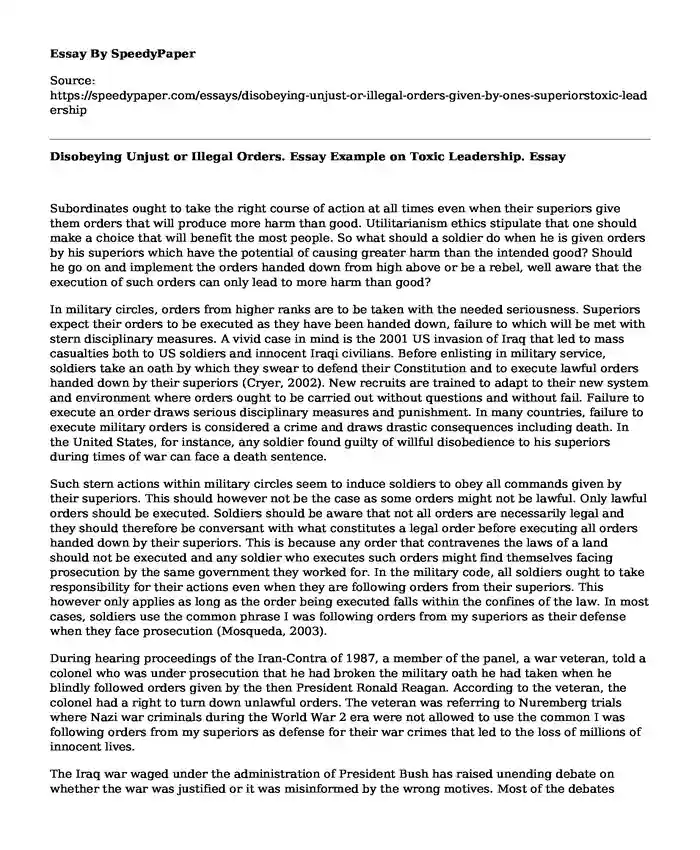
| Type of paper: | Essay |
| Categories: | Management Army |
| Pages: | 4 |
| Wordcount: | 861 words |
Subordinates ought to take the right course of action at all times even when their superiors give them orders that will produce more harm than good. Utilitarianism ethics stipulate that one should make a choice that will benefit the most people. So what should a soldier do when he is given orders by his superiors which have the potential of causing greater harm than the intended good? Should he go on and implement the orders handed down from high above or be a rebel, well aware that the execution of such orders can only lead to more harm than good?
In military circles, orders from higher ranks are to be taken with the needed seriousness. Superiors expect their orders to be executed as they have been handed down, failure to which will be met with stern disciplinary measures. A vivid case in mind is the 2001 US invasion of Iraq that led to mass casualties both to US soldiers and innocent Iraqi civilians. Before enlisting in military service, soldiers take an oath by which they swear to defend their Constitution and to execute lawful orders handed down by their superiors (Cryer, 2002). New recruits are trained to adapt to their new system and environment where orders ought to be carried out without questions and without fail. Failure to execute an order draws serious disciplinary measures and punishment. In many countries, failure to execute military orders is considered a crime and draws drastic consequences including death. In the United States, for instance, any soldier found guilty of willful disobedience to his superiors during times of war can face a death sentence.
Such stern actions within military circles seem to induce soldiers to obey all commands given by their superiors. This should however not be the case as some orders might not be lawful. Only lawful orders should be executed. Soldiers should be aware that not all orders are necessarily legal and they should therefore be conversant with what constitutes a legal order before executing all orders handed down by their superiors. This is because any order that contravenes the laws of a land should not be executed and any soldier who executes such orders might find themselves facing prosecution by the same government they worked for. In the military code, all soldiers ought to take responsibility for their actions even when they are following orders from their superiors. This however only applies as long as the order being executed falls within the confines of the law. In most cases, soldiers use the common phrase I was following orders from my superiors as their defense when they face prosecution (Mosqueda, 2003).
During hearing proceedings of the Iran-Contra of 1987, a member of the panel, a war veteran, told a colonel who was under prosecution that he had broken the military oath he had taken when he blindly followed orders given by the then President Ronald Reagan. According to the veteran, the colonel had a right to turn down unlawful orders. The veteran was referring to Nuremberg trials where Nazi war criminals during the World War 2 era were not allowed to use the common I was following orders from my superiors as defense for their war crimes that led to the loss of millions of innocent lives.
The Iraq war waged under the administration of President Bush has raised unending debate on whether the war was justified or it was misinformed by the wrong motives. Most of the debates revolved around the legality of attacking a country that had not waged war against the United States. The popular opinion amongst United States citizens and the world at large was that US waging war against Iraq was wrong, both on moral and political grounds. The United States had signed various international treaties aimed at promoting world peace (Cryer, 2002). The act of instigating/waging war against another country was therefore a violation of this initiative. The plans the Bush administration intended to carry out the war plans were also brought to question. If the war on Iraq was indeed illegal, members of the armed forces had a legal and moral obligation not to follow orders from their commander in chief, if abiding by their oath of office was anything to go by (Mosqueda, 2003). Based on the principles of the utilitarian ethics, one should opt for a choice that maximizes the overall good and minimize the harm associated with a certain course of action. This is in stark contrast with deontological ethics where the morality of an action is based on the adherence to set rules and regulations. Under deontological ethics, the soldiers would have been morally wrong had they acted against their superiors orders, regardless of whether they were right o wrong. Utilitarian ethics would suggest that the soldiers execute orders aimed at promoting the welfare of all humanity, which in this case would have been to resist their chief commander and not take part in the war.
References
Cryer, R. (2002). The Law of Internal Armed Conflict. Journal Of Conflict And Security Law, 7(1), 140-144. http://dx.doi.org/10.1093/jcsl/7.1.140
Mosqueda, L. (2003). A Duty to Disobey All Unlawful Orders. Counterpunch.org. Retrieved 7 September 2016, from http://www.counterpunch.org/2003/02/27/a-duty-to-disobey-all-unlawful-orders/
Cite this page
Disobeying Unjust or Illegal Orders. Essay Example on Toxic Leadership.. (2019, Oct 28). Retrieved from https://speedypaper.net/essays/disobeying-unjust-or-illegal-orders-given-by-ones-superiorstoxic-leadership
Request Removal
If you are the original author of this essay and no longer wish to have it published on the SpeedyPaper website, please click below to request its removal:
- Free Essay: Stylistic Devices Examples
- Essay Example on the Concept of Cross-Cultural Management
- Cold War Essay Example
- Essay Sample Comprising Health Policy Evaluation
- Free Paper with Questions and Answers on Organizational Behaviour and Development
- Essay Sample: The Cereal Industry Before and After 1994 and Its Market Structure
- Free Essay Example: Uses of the Core Curriculum
Popular categories




